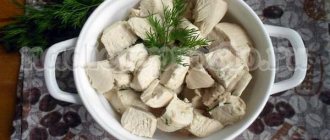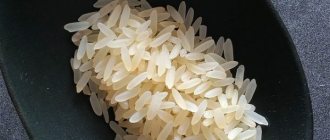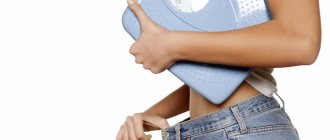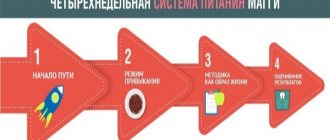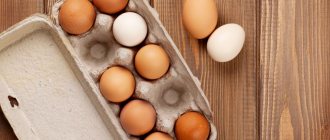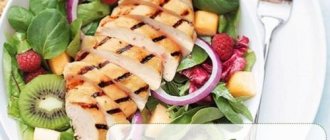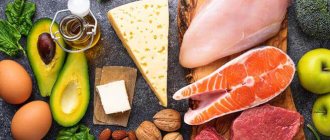There is no need to give up your favorite meat dishes. In some cases, fatty, fried and even alcohol is acceptable. The main prohibition concerns carbohydrates, the lack of which should lead to the processing of the body's fat reserves, and therefore to weight loss. In this regard, it is not allowed to eat flour, fruits and sweets. A real celebration of life! No one will even notice that you are trying to lose extra pounds. All this made high-protein diets (Kremlin, Hollywood, Dr. Atkins, Dukan, the newfangled paleo diet and other variations) truly popular. Unfortunately, comfortable does not always mean useful. Let's try to discover the pitfalls that may lie in wait on the path to the coveted slimness. The task is complicated by the fact that there is very little serious research into the effects of these diets on human health, and there are many individual opinions. Nevertheless, we will try to provide some clarity.
Opinion No. 1: You can lose weight quickly and not experience hunger pangs
According to a comparative study, a high-protein diet, in contrast to the Mediterranean diet, is indeed more effective, at least over a six-month period. The fact is that significantly more calories are spent on digesting proteins. This is a fairly long process, and as a result, the feeling of fullness lasts longer. In addition, ketone bodies (fatty acid oxidation products), the level of which in the body increases significantly during carbohydrate starvation, dulls appetite.
Nevertheless, on such a diet, people manage to gain weight! Why? For example, in the “Kremlin” or Dukan diet there are no restrictions on the volume of meat portions, as a result there is a high probability of overeating. And the meat varies greatly: 100 g of pork contains significantly more fat than chicken. Excess fatty foods can just lead to extra pounds.
The main idea of protein diets is that, without receiving carbohydrates - the main source of energy, the body begins to actively break down fats, which leads to rapid weight loss. In fact, the muscles are the first to be used. Protein from food is certainly used to restore them. But such extreme conditions, associated with additional energy costs, do not improve our health.
Protein diet rules and reviews from nutritionists
Almost all nutrition systems are built on a calorie deficit. A correct and balanced protein diet, reviews of which are regularly written by nutritionists and nutritionists themselves, is based on ketosis. Doctors emphasize that with a properly formulated diet there should be no obsessive feeling of hunger. Protein-rich foods saturate the body, dulling hunger, and reducing carbohydrates leads to increased metabolic processes. To maintain activity, the body takes the consumable “fuel” of their fat reserves, and the subcutaneous tissue becomes thinner.
Do not forget that any protein diet, the reviews and results of which are impressive in photographs alone, were the result of strict adherence to all recommendations. You shouldn’t hope that if you eat one chocolate candy on the 5th day, nothing will happen. The body will leave the special mode of ketosis, and you will have to start all over again. A small amount of carbohydrates as a proper side dish should be included in the protein menu.
A nutritionist's opinion about protein nutrition: A protein diet for weight loss, reviews of which often only describe a quick effect, causes a lot of controversy among nutritionists. Patients do not always seek specialist advice and begin to try different menus on their own. Not everyone immediately understands how to eat so as not to harm themselves, whether the diet differs for two weeks and for a month. If by some miracle, after a month of the protein menu, no obvious harm occurs, the second stumbling block is how to return to the regular menu. Excess protein, lack of fat and enough carbohydrates lead to disagreements.
What foods should be in the diet?
What are the benefits of a protein diet? In simplicity! The easiest option for losing weight is a protein diet for 7 days, reviews of which are impressive in their effectiveness and speed. It is enough to learn how to properly prepare low-fat protein foods and know what you are allowed to eat daily. A big plus for busy people, students, and housewives is that there is no need to invent complex recipes and calculate all the ingredients down to the gram.
The basis of nutrition consists of low-fat protein foods:
- veal, turkey, chicken, turkey fillet, rabbit;
- tuna, salmon, white meat fish;
- eggs, especially whites;
- low-fat milk;
- peas, beans;
- vegetables, non-starchy fruits, any greens.
You need to avoid the following products:
- simple carbohydrates: sweets, white bread, candy;
- grapes, bananas;
- potato;
- fatty semi-finished products;
- smoked meats, canned food.
Digesting proteins takes a lot of energy from the body. Due to the long digestion of natural food and the absence of simple carbohydrates, ketosis begins, burning fat. The main secret is that in addition to nutrition, you need to follow the drinking regime. At least 2 liters of clean water to quickly remove toxins from the body.
Is it worth it or not to go on a protein diet?
Nutritionist's comment: For most patients who come for consultation, a protein diet, especially reviews and photos from the Internet, seems like a quick and safe way to lose excess weight. It, like other diets, has a number of contraindications. If you decide to lose weight, then you should not go to extremes, independently choosing a regime on the verge of starvation. Apart from harm to the body, this will bring nothing.
Pros of protein nutrition:
- absence of hunger attacks;
- slim, toned body;
- reduction of fat under the skin;
- rapid weight loss due to metabolic processes;
- All reviews about the protein diet clearly confirm that the lost weight does not return after returning to a normal diet.
The main disadvantages are that:
- nutrition cannot be introduced as a complete diet for life;
- lack of vitamins and long-term weight loss on protein foods can lead to brittle nails and hair loss;
- the diet is not suitable for people with kidney disease or blood clotting;
- Excess protein leads to constipation and colitis.
Violla: The need to fight extra pounds came suddenly after 2 births. I immediately realized that without a gym and nutrition, all the wrinkles could not be removed quickly. The protein diet, detailed down to the smallest detail by the trainer, reviews and results of girls from the gym who lost weight on it, became an inspiring force on the path to slimness. With a height of 165 cm, the weight was more than 80 kg! In 3 weeks I lost 9 kg, and my clothes became 2 sizes smaller.
Arina_88: No protein diet, reviews of people who have lost weight, beautiful “before” and “after” photos in swimsuits have never bothered me before. Until the age of 25, the figure was naturally ideal, there were no folds or “sides” hanging. Then a stable family life, sedentary work began, and along with it, excess weight.
Protein diet and sports
Girls and boys dream of a sculpted body, and proteins are the main structural element in this matter. Not only nutritionists, but also professional athletes should ask the question of whether it is worth sticking to a protein diet. Here is one of the comments in the group where they asked about the benefits of protein, “drying” and relief:
@vladpopolytof “Beginner athletes come to the gym and immediately ask for advice on how to dry themselves out. You only need to dry if you have muscle mass. Don’t forget that not only a protein diet helps you lose weight quickly, but reviews and results of people who have lost weight with impressive photos are the result of a lot of work. Without training and a minimal increase in activity, it is impossible to achieve a model slim body.”
Opinion No. 2: It is difficult to maintain the achieved results
According to Fatima Dzgoeva, as soon as nutrition returns to normal, the weight is gained again. Having used up its strategic reserve of glycogen, the body sacrifices everything to obtain carbohydrates, even converting its own proteins into glucose (gluconeogenesis). In this way, not only fat, but also protein mass of the body is intensively lost. Naturally, as soon as the diet is interrupted, losses have to be replenished, and with a reserve.
According to Natalia Lyutova, protein, fat and carbohydrate balance are very strongly interconnected, the exclusion of one of the components is serious stress for the body. He will, of course, try to compensate for the damage, but this will require a lot of energy. As a result, the body will require a lot of high-quality food, a lot of carbohydrates.
A smooth exit from the diet will help maintain the results achieved. It is necessary to gradually reduce the amount of protein by introducing more vegetables, fruits and cereals into the diet.
results
Many people are interested in how many kilograms can be lost in 30 days of a protein diet if you strictly follow the recommended menu. Results may vary and depend on individual performance. To see minus 10 kg per month on the scales (which is quite realistic), you need:
- don't get sick;
- exercise during a month of a protein diet;
- to be in a good mood;
- really want to lose weight;
- constantly be in touch with nutritionists, doctors, fitness trainers;
- follow the menu exactly;
- get rid of bad habits.
Do you want to lose weight quickly, tasty and easily? A well-designed protein diet menu for 4 weeks will help you achieve good results and maintain them for a long time. But this will require patience, compliance with all recommendations and a great desire to say goodbye to the hated kilograms as quickly as possible.
If a 30-day diet may seem too long and exhausting to you, we recommend testing yourself in shorter fasts: a protein diet for , , days. The choice is yours.
Opinion No. 3: Possible heaviness in the stomach, flatulence, constipation
When following a diet for a long time, excess protein accumulates in the body, which it has difficulty coping with. The problem is aggravated by the fact that proteins are not stored in reserve, as is the case with fats. The norm for an adult is 0.8–1 g of protein per 1 kg of weight. The final value depends on lifestyle, age, general condition of the body and other factors. Typically, if you weigh 70 kg, 56–70 g of protein per day is enough. For example, 100 g of chicken meat contains approximately 20 g of protein, respectively, 250–300 g of chicken is the maximum amount of meat per day that the body can cope with. But we eat much more.
Difficult-to-digest protein accumulates in the gastrointestinal tract, causing fermentation processes. In addition, due to a sharp reduction in the diet of vegetables, the influx of dietary fiber is limited, which negatively affects intestinal motility. You can also add that protein diets are low in fat - there is too little lubrication to remove metabolic products from the body. Hence bloating, heaviness in the stomach and constipation.
It is recommended to drink more water, especially before meals, eat wheat and oat bran, dairy products - for example, low-fat yogurt with prunes. Light physical activity will also help - brisk walking, abdominal exercises. If these measures are ineffective, you should definitely return to a balanced diet. Ksenia Selezneva draws attention to the fact that a deficiency or excess of at least one of the components (proteins, fats, carbohydrates, vitamins and microelements) for a long time will inevitably lead to digestive disorders and metabolism in general.
Menu
Writing out a detailed menu for a month for a protein diet is a troublesome task only at first glance. In fact, there are already developed and approved recommendations with precise descriptions of dishes suitable for this weight loss technique. They need to be adopted and only slightly adjusted in accordance with your taste preferences. For example, if you don't like grapefruit, you can replace it with orange without any loss.
So, we offer for consideration the first menu option as part of a protein diet for a month.
First week
Day 1
- We have breakfast: an egg (one whole or 2 whites), unsweetened coffee.
- Snack: grapefruit (it is advisable to include citrus fruits in the protein menu).
- Lunch: spinach soup, chicken.
- We have an afternoon snack: cottage cheese.
- Dinner: beef.
Day 2
- We have breakfast: an egg (one whole or 2 whites), unsweetened coffee.
- Snack: orange.
- We have lunch: salmon with milk, zucchini with cabbage.
- We have an afternoon snack: kefir.
- Dinner: vegetable salad (there should be no potatoes in the protein menu).
Day 3
- We have breakfast: an egg (one whole or 2 whites), unsweetened coffee.
- Snack: tangerine (1 or 2).
- We have lunch: oriental soup with egg and pink salmon, cabbage with meat.
- We have an afternoon snack: fermented baked milk.
- Dinner: pollock.
Day 4
- We have breakfast: an egg (one whole or 2 whites), unsweetened coffee.
- Snack: kiwi.
- We have lunch: meatballs in broth, tuna.
- We have an afternoon snack: yogurt.
- Dinner: shrimp.
Day 5
- We have breakfast: an egg (one whole or 2 whites), unsweetened coffee.
- Snack: a few slices of pineapple.
- We have lunch: bran soup, mushrooms and vegetables.
- Afternoon snack: yogurt.
- Dinner: chicken breast.
Day 6
- We have breakfast: an egg (one whole or 2 whites), unsweetened coffee.
- Let's have a snack: pomelo.
- We have lunch: yolk puree soup, stew with beans and meat.
- We have an afternoon snack: cottage cheese.
- Dinner: turkey.
Day 7
- We have breakfast: an egg (one whole or 2 whites), unsweetened coffee.
- Snack: lime.
- We have lunch: noodle soup, zucchini in foil.
- We have an afternoon snack: kefir.
- Dinner: pike perch.
Second week
Day 8
- Breakfast: egg (one whole or 2 whites), unsweetened green tea.
- Snack: apple.
- Lunch: protein okroshka, beef.
- Afternoon snack: casserole.
- Dinner: chicken puff pastry.
Day 9
- Breakfast: egg (one whole or 2 whites), unsweetened green tea.
- Snack: peach (1 or 2).
- Lunch: asparagus soup, chicken breast.
- Afternoon snack: yogurt.
- Dinner: protein salad, toast.
Day 10
- Breakfast: egg (one whole or 2 whites), unsweetened green tea.
- Snack: apricot.
- Lunch: cabbage soup, tuna.
- Afternoon snack: kefir.
- Dinner: buckwheat in a pot.
Day 11
- Breakfast: egg (one whole or 2 whites), unsweetened green tea.
- Snack: nectarine.
- Lunch: fish soup, beet salad.
- Afternoon snack: yogurt.
- Dinner: omelet.
Day 12
- Breakfast: egg (one whole or 2 whites), unsweetened green tea.
- Snack: orange.
- Lunch: cheese soup, vitamin carrot salad.
- Afternoon snack: milk.
- Dinner: stuffed squid.
Day 13
- Breakfast: egg (one whole or 2 whites), unsweetened green tea.
- Snack: grapefruit.
- Lunch: any puree soup, vinaigrette.
- Afternoon snack: feta cheese.
- Dinner: pike perch.
Day 14
- Breakfast: egg (one whole or 2 whites), unsweetened green tea.
- Snack: pomelo.
- Lunch: soup with porcini mushrooms, pike.
- Afternoon snack: cottage cheese.
- Dinner: shrimp.
Third week
Day 15. Fruit menu
- We have breakfast: salad (pear, apple, berries), orange juice.
- Snack: peaches.
- Lunch: fruit puree soup, prunes baked in foil.
- We have an afternoon snack: cottage cheese with pineapple pieces.
- Dinner: apricot pudding.
Day 16. Vegetable menu
- We have breakfast: salad of peas, peppers, tomatoes, cucumbers, carrot juice.
- Snack: avocado.
- We have lunch: broth with asparagus, vegetable stew.
- We have an afternoon snack: boiled broccoli.
- Dinner: pumpkin.
Day 17. Fruit and vegetable
- Breakfast: carrot salad, peach juice.
- Snack: grapefruit.
- We have lunch: cabbage soup, stewed eggplant.
- We have an afternoon snack: sandwiches with zucchini.
- Dinner: turnips in the oven.
Day 18. Fish
- We have breakfast: omelet with salmon, unsweetened coffee.
- Snack: tuna sandwich.
- We have lunch: fish soup, seafood.
- We have an afternoon snack: tortilla with trout.
- Dinner: fish pie.
Day 19. Meat
- We have breakfast: cold boiled pork, unsweetened green tea.
- Let's have a snack: a sandwich with a piece of chicken breast.
- We have lunch: meatballs in broth, beef.
- We have an afternoon snack: a piece of meat pie.
- Dinner: turkey.
Day 20. Fruity
- We have breakfast: (pear, apple, berries), peach juice.
- Let's have a snack: pomelo.
- Lunch: rice soup with fruit, casserole with oranges.
- Afternoon snack: baked apple.
- Dinner: charlotte with peaches.
Day 21. Fruity
- Breakfast: (pear, apple, berries), pineapple juice.
- Snack: grapefruit.
- We have lunch: soup with pasta and apples, casserole with peaches.
- We have an afternoon snack: fruit canapés.
- Dinner: pears stuffed with cottage cheese.
Fourth week
Day 22
- Breakfast: omelet, black tea.
- Lunch: pomelo.
- Lunch: chicken broth, turkey.
- Afternoon snack: cottage cheese.
- Dinner: casserole.
Day 23
- Breakfast: omelet, black tea.
- Lunch: grapefruit.
- Lunch: noodle soup, beef.
- Afternoon snack: milk.
- Dinner: tuna.
Day 24
- Breakfast: omelet, black tea.
- Lunch: a few slices of pineapple.
- Lunch: fish soup, chicken breast.
- Afternoon snack: yogurt.
- Dinner: stuffed zucchini.
Day 25
- Breakfast: omelet, black tea.
- Lunch: orange.
- Lunch: asparagus soup, chicken cutlets.
- Afternoon snack: yogurt.
- Dinner: stewed buckwheat.
Day 26
- Breakfast: omelet, black tea.
- Lunch: kiwi.
- Lunch: spinach soup, turkey.
- Afternoon snack: fermented baked milk.
- Dinner: salad with peppers, tomatoes.
Day 27
- Breakfast: omelet, black tea.
- Lunch: tangerines (1 or 2).
- Lunch: porcini mushroom soup, beef.
- Afternoon snack: kefir.
- Dinner: shrimp.
Day 28
- Breakfast: omelet, black tea.
- Lunch: pomelo.
- Lunch: cheese soup, chicken.
- Afternoon snack: yogurt.
- Dinner: stuffed squid.
When drawing up such a protein diet menu for a month, consider the following nuances:
- Portions should be: for breakfast - 150 grams, for lunch - 200 ml of the first and 150 grams of the second, for lunch - 200 ml (or grams), for dinner - 150 grams.
- For lunch on a protein diet, include 200 ml of a protein shake in the menu, and for dinner - the same amount of fruit or vegetable juice.
- All dairy products on the menu should have a minimum fat content. Better - completely low-fat.
- Second courses (meat, fish, vegetables) from the protein menu are baked in the oven or steamed.
When creating a menu for this protein diet, you can use different sources. There is a very convenient table where dishes are listed by day for the entire month.
Despite the protein menu, it is difficult to lose weight without fruits, since the body still needs to receive vitamins. But this diet excludes the consumption of bananas, figs and grapes, as they are high in calories. Be sure to take this into account when planning your diet for the month. A few examples of protein dishes will help you with this.
Opinion #4: Excessive protein intake puts unnecessary strain on the kidneys.
Take the test
Is your metabolism ok?
Kidneys are filters that cleanse the blood of waste products from the body. Excessive protein intake can lead to hyperfiltration, glomerulosclerosis, and intrarenal capillary hypertension. The fact is that protein foods are rich in purines (from meat and offal - liver, kidneys, muscles, brain, tongue), the breakdown products of which (urates or uric acid salts) accumulate in the blood plasma. This leads to the deposition of uric acid salts in the form of crystals in the body tissues, especially in the kidneys. The joints also suffer. To remove the toxic compounds that form from the body, it is recommended to drink more water, but this also puts additional stress on the urinary system. It is important to adhere to the following norm: 30 ml of water per 1 kg of body weight.
The right way out of a protein diet
Experts advise exiting any diet gradually. The protein nutrition system is no exception. You should not immediately pounce on your favorite foods, the consumption of which was prohibited during the program. It is better to exclude sugar and flour products from your diet altogether.
In addition , you must continue to adhere to the regime: eat at least 5-6 times a day in small portions, do not eat 2-3 hours before bedtime, drink more water and give up alcoholic beverages.
In the first 2 weeks after a protein diet, physical activity should also be increased. This should be done in order to optimally use the incoming energy and maintain the result obtained.
Opinion #5: Risk of Cardiovascular Disease
The increased risk of cardiovascular disease from excessive consumption of red meat has been confirmed by a number of epidemiological studies. The main culprit of these problems is traditionally considered to be “bad” cholesterol.
But it turned out that it's not just cholesterol. Scientists from the Harvard Stem Cell Institute also associate the problems that arise with a disruption in the renewal of vascular walls due to excess protein. The results of their experiment were published in the Proceedings of the National Academy of Sciences. According to the researchers, even in conditions of a sufficient amount of building material (proteins), cells began to divide more slowly. In place of the dying ones, microdamages formed, in which atherosclerotic plaques formed. The growth of new capillaries practically stopped.
However, there is also a completely opposite opinion. Thus, the famous American healthy eating trainer, biochemist Robb Wolf made a sensational statement: the “bad” type of high-density lipoproteins, which are involved in the transport of cholesterol and have the habit of sticking to the inner surface of the arteries, also arises from excess carbohydrates!
Opinion No. 6: Increased risk of cancer, autoimmune diseases, osteoporosis
Abuse of proteins can disrupt the acid-base balance in the body when oxidation products of proteins and fats (ketone bodies, lactic, pyruvic, acetoacetic and other acids) accumulate in the tissues. Which can lead to the development of metabolic acidosis (ketoacidosis; from the Latin acidus - “sour”), intoxication of the body. It is known that ketone bodies (in other words, acetone) can stimulate the growth of cancer cells and autoimmune diseases. “The protein is a structural element of the tumor. Usually, people who have suffered from cancer are limited in protein in their diet and switched to complex carbohydrates. Unfortunately, there is little accurate data. Now in Europe, a large-scale study of the effect of food on various types of cancer is just being carried out,” notes Fatima Dzgoeva.
Of course, the body fights to maintain a constant internal environment by initiating special biochemical reactions. In case of acidosis, it is necessary to neutralize excess acid, for this purpose calcium from the bones is used, which leads to thinning of bone tissue, there is a risk of developing osteoporosis, hair and nails become brittle. By the way, it is precisely because of ketoacidosis that adherents of protein diets may have an unpleasant acetone odor from the mouth and an unhealthy complexion.
Conclusions "Health"
1. High protein diets can really help you lose extra pounds quickly. Eating protein-rich foods can satisfy your hunger for a long time. However, any amateur activity is not welcome here. It is important to strictly follow the instructions of a nutritionist, who will select the timing and proportions that are necessary for you. In the wrong hands, diet can cause serious health problems. Bran, water and dairy products will help you survive carbohydrate starvation.
2. The most difficult thing when losing weight on a high-protein diet is maintaining the results achieved. Many people break down and quickly gain weight. It is important to gradually return to a balanced diet by introducing fruits, vegetables and grains into your diet. It has been proven that only changing lifestyle and eating habits works in the long term.
3. Before deciding on one of the high protein diets, it is important to make sure that all body systems are working properly and weigh the pros and cons. Any diet, especially an unbalanced one, is a strong burden, even stress. There are serious medical contraindications. In addition, there are very few large-scale studies of the effects of high-protein diets on human health. According to scientific evidence, they are at the lowest level - D (development of a consensus by a group of experts on a specific problem). Some nutritionists use them as an emergency short-term measure to quickly overcome a temporary stop in weight loss.
Advantages and disadvantages
Human food consumption is regulated by two feelings - hunger and satiety. Hunger prompts a person to go in search of food, and if it is available, start eating and get enough.
Even with enough food, a person stops eating when he feels full. Ideally, saturation should occur when exactly the amount of food is consumed that ensures that the energy intake is equal to its expenditure.
This is where the problem lies - the human body does not have receptors (sensors) that respond to calories. All kinds of receptors react to blood sugar levels, the degree of stomach filling, and the amount of fat reserves. Ultimately, everything depends on the satiety of food, and the question of satiety of different types of food has been studied in some detail.
Important! The satiety of food is determined by its component composition, namely the amount of proteins, fats, carbohydrates and water in a serving of food.
Simple carbohydrates (sugars) do not make any contribution to satiety (the feeling of fullness is measured 2 hours after eating, when simple carbohydrates have already been digested and absorbed), some contribution is made by fats, the water contained in the product makes an even greater contribution, a significant contribution is inherent in complex carbohydrates (to which includes dietary fiber), but proteins are the most satiating.
Hence 2 weight loss strategies:
- if time allows you to lose weight gradually, it is enough to adhere to a balanced diet, cutting calories by 400-500 kcal per day (or, more rationally, cutting calories by 200-300 kcal, and increasing physical activity by the same amount);
- if you need to quickly lose weight, the calorie deficit is increased to 800-1000 kcal. As a rule, in this case, the feeling of hunger does not allow you to stay on a diet for a long time. And those losing weight resort to a protein diet menu for 4 weeks with a high content of proteins and dietary fiber, with the absence of simple carbohydrates and a moderate (but quite sufficient) content of fats and complex carbohydrates.
In the case of a 4-week protein diet, everything is simple - we eat meat, eggs, dairy products and vegetables, and carefully include cereals and fruits in the diet. It is impossible to eat like this for a long time, which is why a month is the maximum period for losing weight on a protein diet.
Peculiarity! A protein diet is suitable for young people who lead an active lifestyle and want to lose up to 20 kg per month.
The protein diet menu for 4 weeks is adjusted according to your feelings, but counting calories every day is not excluded. The average calorie content of a protein diet for a month is about 1200 kcal (on a 2-week protein diet, a more strict calorie restriction is allowed, the diet is limited to 700-800 kcal).
A portion of cottage cheese on a diet is usually 100-200 g, beef or poultry 100-150 g, fish - 150-200 g. Porridge (buckwheat, oatmeal or rice) is boiled in water or skim milk, using 50 g of dry cereal. Apple , orange and grapefruit are medium in size, the orange can be replaced with two tangerines, and the grapefruit with three.
Vegetable salad options:
- cucumber and celery;
- cucumbers and tomatoes;
- tomatoes and greens.
The total weight of vegetables is up to 200 g; the salad is seasoned with 1 tablespoon of a mixture of sunflower or olive oil with mustard or camelina oil, which will provide the body with the necessary mono- and polyunsaturated fatty acids in optimal proportions.
Tea (black or green) without sugar or sweeteners, kefir or yogurt in a glass (200 ml).
Important! The total amount of liquid per day should not be less than 2 liters, preferably clean still water.
Lose weight at any cost
If you still like protein diets, take the following precautions:
– choose nutrition systems that limit carbohydrates less;
– do not rely heavily on semi-finished products, although, for example, in the Kremlin diet they are equivalent in points to fresh meat or fish, they contain many dyes and food additives;
– give preference to lean meats;
– take complexes of vitamins and microelements;
– don’t forget about water and bran, as well as low-fat dairy products,
– do not try to solve problems that have been accumulating for years in a couple of weeks – sudden weight loss will not be beneficial.
Protein diets are contraindicated for people who have problems with the kidneys, stomach or heart, gout, diseases of the endocrine system, menstrual irregularities and, of course, pregnant and breastfeeding women.
The essence of a protein diet
The protein diet is based on the following postulates:
- simple carbohydrates are completely excluded;
- proteins make up 60% of the daily diet;
- fats (exclusively vegetable) are present in minimal quantities;
- Protein foods for better digestion are supplemented with a small amount of vegetables and fruits.
It is known that carbohydrates are the main sources of energy. When they are completely removed from the diet, an energy deficit occurs, and then the body begins to burn glycogen, and then fats.
- Food on a protein diet should be taken in small portions every 2.5–3 hours, 5-6 times a day, while doing fitness daily.
- Particular attention should be paid to the quality of products. Sausages, smoked meats and semi-finished products from the supermarket should definitely be excluded, because first-class meat and fats are not always used in their preparation. In addition, it includes all kinds of herbal and chemical additives - preservatives, dyes, flavors, etc.
- Preference should be given to lean varieties of meat, poultry and fish, because the abundance of lipids interferes with the complete absorption of protein. In this regard, it is better to avoid eating salmon, catfish, goose and duck, cod liver, pork and beef brisket.
I can't and I don't want to
Protein diets can negatively affect male potency, because the body is under severe stress. He has to neutralize a large number of breakdown products of food proteins. I just don't have enough energy for sex. Excess cholesterol, a constant companion of such a diet, also negatively affects potency. In order for a man’s sexual function to be normal, vitamins A, groups B and E are needed. They are found in grain products, vegetables and fruits, that is, exactly what protein diets limit. In addition, people suffering from obesity go on diets, which in itself significantly reduces potency. A protein diet can worsen the situation.
Useful tips
To effectively lose weight, it is not enough to correctly create and then stick to a menu for every day as part of a protein diet. You need to follow a few more useful recommendations from nutritionists. They will help speed up the process of disappearing fat deposits. What do I need to do?
- Obtain a doctor's permission to follow a monthly protein diet.
- Confirm the menu with a nutritionist.
- Have dinner long before bedtime (about 4 hours).
- Don't go to bed after midnight.
- Take multivitamins for a month while you are on a diet.
- Walk for half an hour a day.
- Do not engage in strength or cardio training as part of a protein diet.
- Ride a bike, swim, go to shaping or aerobics.
- Count calories on the menu.
- In addition to the menu, drink up to 2 liters of clean water per day.
- Do not lose weight with this diet if you have kidney disease or are over 55 years old.
- For dizziness, you need to include carbohydrates in the menu.
If you follow all these recommendations, a protein diet for weight loss for 4 weeks will seem quick and easy, and the results will surprise and delight the most demanding.
To eat or not to eat?
According to a large European study, the EPIC-Oxford study, which covered more than 65 thousand people, the diet of meat eaters who consumed red meat more than 3 times a week was 14% higher in calories than that of vegetarians and people who often eat fish. In addition, the consumption of saturated fatty acids was doubled compared to the recommended norm, the consumption of dietary fiber, and the dietary intake of folate, vitamins C, E, and thiamine were reduced by approximately 40%. It has been suggested that meat consumption influences changes in enzymatic composition, which provoke gene polymorphism, possibly leading to the development of cancer cells. There is scientific evidence that frequent consumption of meat increases the risk of type 2 diabetes by almost 2 times due to impaired carbohydrate metabolism. In addition, N-nitrosamines are formed during digestion, which can have a toxic effect on pancreatic cells
Nevertheless, meat is one of the most important sources of iron and zinc (and in an easily digestible hemoform), as well as monounsaturated and omega-3 polyunsaturated fatty acids necessary for essential physiological processes. Moderation is good in everything.

